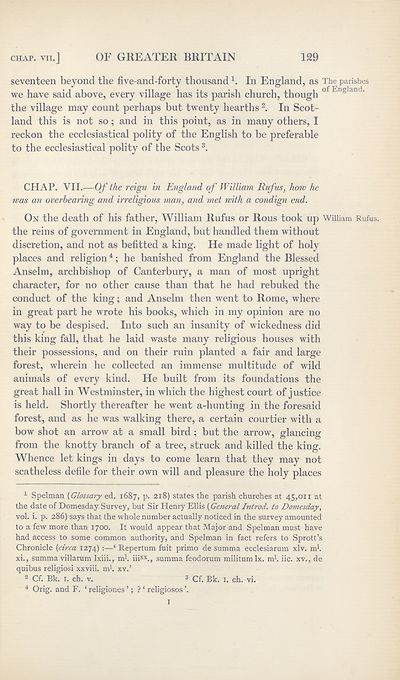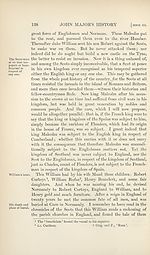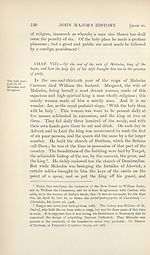Series 1 > History of Greater Britain, as well England as Scotland
(274) Page 129
Download files
Complete book:
Individual page:
Thumbnail gallery: Grid view | List view

CHAP. VII.]
OF GREATER BRITAIN
129
seventeen beyond the five-and-forty thousand1. In England, as The parishes
we have said above, every village has its parish church, though of England-
the village may count perhaps but twenty hearths2. In Scot¬
land this is not so; and in this point, as in many others, I
reckon the ecclesiastical polity of the English to be preferable
to the ecclesiastical polity of the Scots 3.
CHAP. VII.—Of the reign in England of William Rufus, how he
was an overbearing and irreligious man, and met with a condign end.
On the death of his father, William Rufus or Rous took up William Rufus,
the reins of government in England, but handled them without
discretion, and not as befitted a king. He made light of holy
places and religion4; he banished from England the Blessed
Anselm, archbishop of Canterbury, a man of most upright
character, for no other cause than that he had rebuked the
conduct of the king; and Anselm then went to Rome, where
in great part he wrote his books, which in my opinion are no
way to be despised. Into such an insanity of wickedness did
this king fall, that he laid waste many religious houses with
their possessions, and on their ruin planted a fair and large
forest, wherein he collected an immense multitude of wild
animals of every kind. He built from its foundations the
great hall in Westminster, in which the highest court of justice
is held. Shortly thereafter he went a-hunting in the foresaid
forest, and as he was walking there, a certain courtier with a
bow shot an arrow at a small bird; but the arrow, glancing
from the knotty branch of a tree, struck and killed the king.
Whence let kings in days to come learn that they may not
scatheless defile for their own will and pleasure the holy places
1 Spelman (Glossary ed. 1687, p. 218) states the parish churches at 45,011 at
the date of Domesday Survey, but Sir Henry Ellis (General Introd. to Domesday,
vol. i. p. 286) says that the whole number actually noticed in the survey amounted
to a few more than 1700. It would appear that Major and Spelman must have
had access to some common authority, and Spelman in fact refers to Sprott’s
Chronicle (circa 1274) :—‘ Repertum fuit primo de summa ecclesiarum xlv. m1.
xi., summa villarum Ixiii., m1. iiixx., summa feodorum militumlx. m1. iic. xv., de
quibus religiosi xxviii. m1. xv.’
2 Cf. Bk. 1. ch. v. 2 Cf. Bk. 1. ch. vi.
4 Orig. and F. ‘ religiones ’; ? ‘ religiosos ’.
OF GREATER BRITAIN
129
seventeen beyond the five-and-forty thousand1. In England, as The parishes
we have said above, every village has its parish church, though of England-
the village may count perhaps but twenty hearths2. In Scot¬
land this is not so; and in this point, as in many others, I
reckon the ecclesiastical polity of the English to be preferable
to the ecclesiastical polity of the Scots 3.
CHAP. VII.—Of the reign in England of William Rufus, how he
was an overbearing and irreligious man, and met with a condign end.
On the death of his father, William Rufus or Rous took up William Rufus,
the reins of government in England, but handled them without
discretion, and not as befitted a king. He made light of holy
places and religion4; he banished from England the Blessed
Anselm, archbishop of Canterbury, a man of most upright
character, for no other cause than that he had rebuked the
conduct of the king; and Anselm then went to Rome, where
in great part he wrote his books, which in my opinion are no
way to be despised. Into such an insanity of wickedness did
this king fall, that he laid waste many religious houses with
their possessions, and on their ruin planted a fair and large
forest, wherein he collected an immense multitude of wild
animals of every kind. He built from its foundations the
great hall in Westminster, in which the highest court of justice
is held. Shortly thereafter he went a-hunting in the foresaid
forest, and as he was walking there, a certain courtier with a
bow shot an arrow at a small bird; but the arrow, glancing
from the knotty branch of a tree, struck and killed the king.
Whence let kings in days to come learn that they may not
scatheless defile for their own will and pleasure the holy places
1 Spelman (Glossary ed. 1687, p. 218) states the parish churches at 45,011 at
the date of Domesday Survey, but Sir Henry Ellis (General Introd. to Domesday,
vol. i. p. 286) says that the whole number actually noticed in the survey amounted
to a few more than 1700. It would appear that Major and Spelman must have
had access to some common authority, and Spelman in fact refers to Sprott’s
Chronicle (circa 1274) :—‘ Repertum fuit primo de summa ecclesiarum xlv. m1.
xi., summa villarum Ixiii., m1. iiixx., summa feodorum militumlx. m1. iic. xv., de
quibus religiosi xxviii. m1. xv.’
2 Cf. Bk. 1. ch. v. 2 Cf. Bk. 1. ch. vi.
4 Orig. and F. ‘ religiones ’; ? ‘ religiosos ’.
Set display mode to:
![]() Universal Viewer |
Universal Viewer | ![]() Mirador |
Large image | Transcription
Mirador |
Large image | Transcription
Images and transcriptions on this page, including medium image downloads, may be used under the Creative Commons Attribution 4.0 International Licence unless otherwise stated. ![]()
| Scottish History Society volumes > Series 1 > History of Greater Britain, as well England as Scotland > (274) Page 129 |
|---|
| Permanent URL | https://digital.nls.uk/127735053 |
|---|
| Attribution and copyright: |
|
|---|
| Description | Over 180 volumes, published by the Scottish History Society, containing original sources on Scotland's history and people. With a wide range of subjects, the books collectively cover all periods from the 12th to 20th centuries, and reflect changing trends in Scottish history. Sources are accompanied by scholarly interpretation, references and bibliographies. Volumes are usually published annually, and more digitised volumes will be added as they become available. |
|---|


